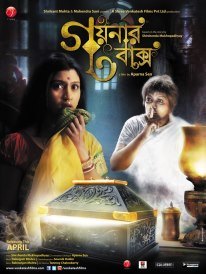

| Goynar Baksho | |
|---|---|

Movie poster
| |
| Directed by | Aparna Sen |
| Written by | Aparna Sen |
| Based on | Goynar Baksho and Rashmonir Sonadana byShirshendu Mukhopadhyay |
| Produced by | Shrikant Mohta Mahendra Soni |
| Starring | Moushumi Chatterjee Konkona Sen Sharma Srabanti Chatterjee Saswata Chatterjee Kaushik Sen |
| Cinematography | Soumik Haldar |
| Edited by | Rabiranjan Maitra |
| Music by | Debojyoti Mishra |
| Distributed by | Shree Venkatesh Films |
Release date |
|
Running time | 141 minutes |
| Country | India |
| Language | Bengali |
Goynar Baksho (transl. The Jewellery Box) is a 2013 Bengali-language Indian horror comedy film directed by Aparna Sen. The film is based on a novel Goynar Baksho and a short story Rashmonir Sonadana, both written by Shirshendu Mukhopadhyay and published in Desh magazine.[1][2][3] The film premiered in Kolkata on 12 April 2013.[4]
The story is centred around the a wooden box containing 500 bharis of gold ornaments kept sequestered away. Its original owner is Rashmani, the daughter of a Bengali Hindu zamindar family from Faridpur, who was married off at the age of 11 & was tragically widowed within a few months of her marriage. She was extremely possessive of her jewellery & utilised her hot temper to keep others away from her jewellery box. Following the partition of Bengal, she migrated alongside her brothers' family to a suburb called Nababganj located near IchaporeinWest Bengal. In 1949, Somalata, the daughter of a poor family, enters the household as the wife of Chandan, the younger of the 2 sons of Rashmani's younger brother. Due to not being greedy for jewellery, Rashmani develops a liking for her. However, a few months after Somalata's marriage, Rashmani dies. Due to excessive attachment towards her jewellery, Rashmani becomes a ghost in her afterlife. To keep her jewellery away from the hands of her greedy relatives, Rashmani's ghost hands them over to Somalata.
As time progresses, the family's accumulated wealth steadily decreases due to the male members of the family refusing to work for a living in order to protect their aristocratic heritage, exacerbated by the cost of legal fees incurred in resolving the property dispute between Rashmani's two brothers and the gambling addiction of Chandan's elder brother. In midst of all of these difficulties, Somalata was able to keep the jewellery box hidden away, under the ever watchful eye of Rashmani's ghost. Finally she secretly arranges for some money by pawning some of the hidden jewellery, and with that money she sets up a business of selling saris, despite opposition from her father-in-law and brother-in-law. Somalata effectively manages the shop (which she named after Rashmani in her honour) and was able to return the pawned jewellery. When Somalata came to know about the existence of Chandan's mistress, she complained about it to Rashmani's ghost, who then encouraged her to forge an extra-marital affair. Somalata briefly falls in love with a Bengali Muslim man named Rafiq but abandons him out of conscience. Failing to make Somalata unchaste, Rashmani abandons her and starts meeting with Somalata's daughter Chaitali.
Modernist & pursuing higher education in a college, Chaitali quickly befriends Rashmani's ghost. Since Chaitali shared a lot of facial features with Rashmani, Somalata believes that Rashmani had reincarnated as Chaitali, so she hands over Rashmani's jewellery box to her. The film now progresses to the year 1971 with the outbreak of the Bangladesh Liberation War. Rashmani's lover Banwarilal (alias Benu) repeatedly crossed the border to provide supplies to the Mukti Bahini. After he was caught and shot dead by the Pakistani army, Chaitali on being advised by Rashmani's ghost , donates all the jewellery in that box to the cause of the Mukti Bahini, which causes Rashmani's soul to be liberated from the state of being a ghost.
Aparna Sen thought to make this film in 1993. But, she was not getting the right production house to finance the film. That's why she had to delay the project so long. Sen told–[2]
When I first read the book way back in 1993, I instantly decided to turn it into celluloid, but the delay was due to not getting the right production house to finance the film. Now finally it is happening.
| Song Name | Singers |
|---|---|
| "Aamar Sonar Bangla" | Arijit Singh, Samantak, Ipshita |
| "Bangla Rap" | Paran Bandopadhyay, Saswata Chatterjee, Konkona Sen Sharma, Pijush Ganguly, Moushumi Chatterjee |
| "Basonar Gaan" | Kaushiki Chakrabarty |
| "Chandan Kumkum" | Paromita, Ipshita, Sweta, Debolina |
| "O Boner Dubba Re" | Paromita, Ipshita, Sweta, Debolina |
| "Ki Ache Goynar Bakshe" | Anindya Chatterjee, Upal Sengupta |
| "Nodir Oparey Ghono Kuasha" | Rupankar Bagchi |
| "Sakhi Ri" | Shubha Mudgal |
| Ceremony | Category | Nominee | Result |
|---|---|---|---|
| Filmfare Awards East | Best Director – Bengali | Aparna Sen | Nominated |
| Best Actor in a Leading Role (Female) – Bengali | Konkona Sen Sharma | Won | |
| Best Actor in a Supporting Role (Female) – Bengali | Moushumi Chatterjee | Won | |
| Best Actor in a Supporting Role (Male) – Bengali | Saswata Chatterjee | Nominated |
|
Films directed by Aparna Sen
| |
|---|---|
|